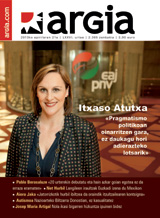Red stripes
Politicians who manage the common heritage are not big generators of metaphors. Rhetoric and poetics, essential in the policy of the past, are not fruitful fields in the action of the current leaders. That is what denounces, for example, the repeated use of different molds: roadmap, red stripes...
And I, who did not want to lose the lesson of democracy, have put in my speech the image of the red lines. As soon as I start writing, I'm shown a red line on my computer to know how far I can go. But, as I have already warned, the computer does not always behave in the same way, that is, not all words live in the same way the tension with red customs.
All that is supposed to be a mistake. How is it possible, if not, for me to lose the name of my neighbour Salburua, or for me to be denied the Mount Olarizu that I see from home?
He who worked in the conciliation of informatics and the Basque Country determined it well (unintentionally?) Basque Country: Unlike Gros, Sagües or Ulia, the screen denounces me in red the houses where I live every day.
There are no breathing spaces without proper speakers. Native speakers are the support, the oraceration, the mainstay and the foundation of the respiratory zones.
But let's start at the beginning: what are the respiratory zones? The word Arnasa is a word translated into Basque... [+]
Kaleko 71.000 elkarrizketa eta 227.900 solaskide behatu dituzte UEMAko herrietan, eta 2017koa baino ikerketa are sendoagoa burutu dute. Erabilera orokorra ez da ia aldatu: bostetik hiru aritzen dira euskaraz. Adina eta generoaren arabera badira desberdintasun batzuk.





















